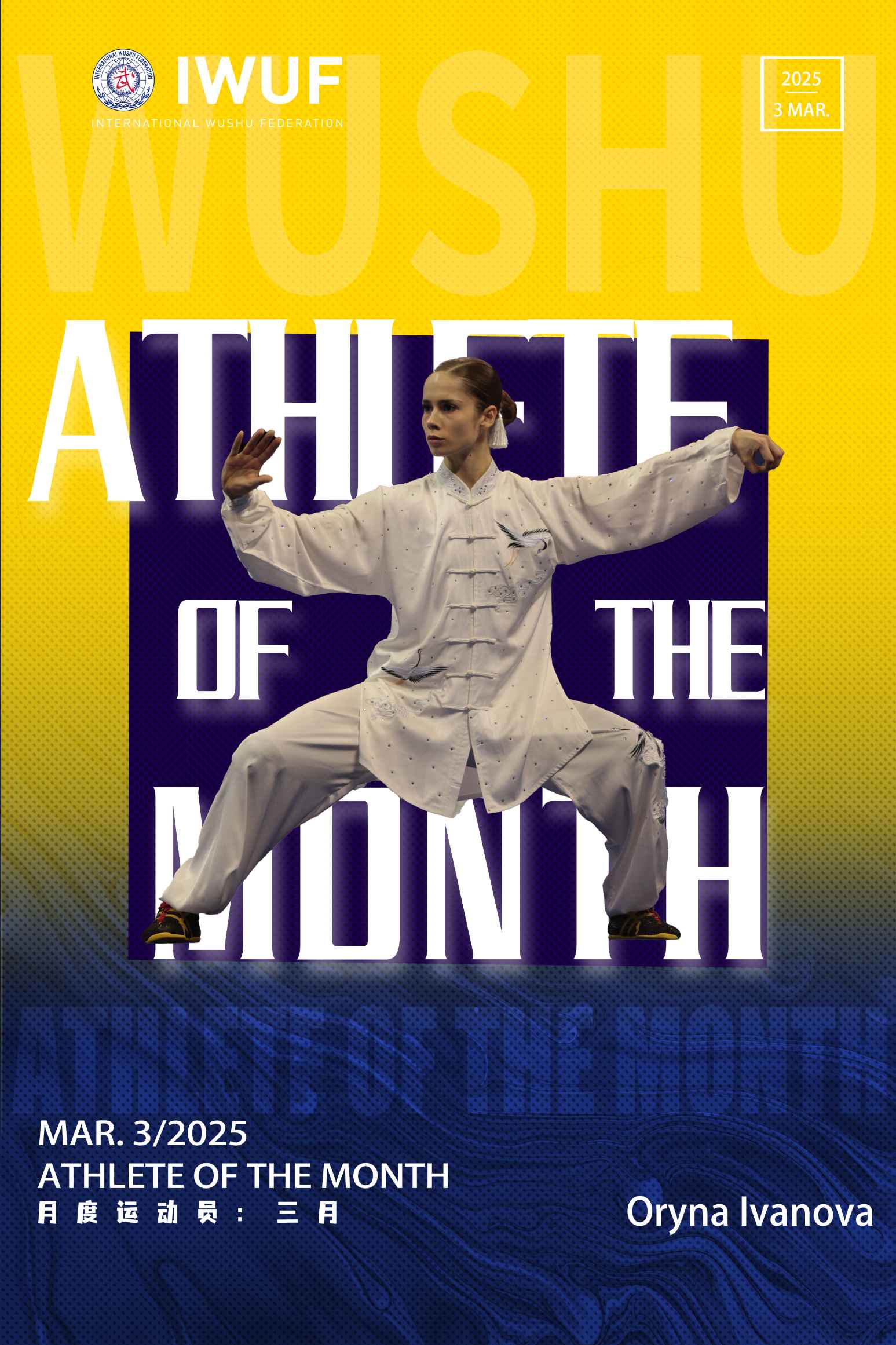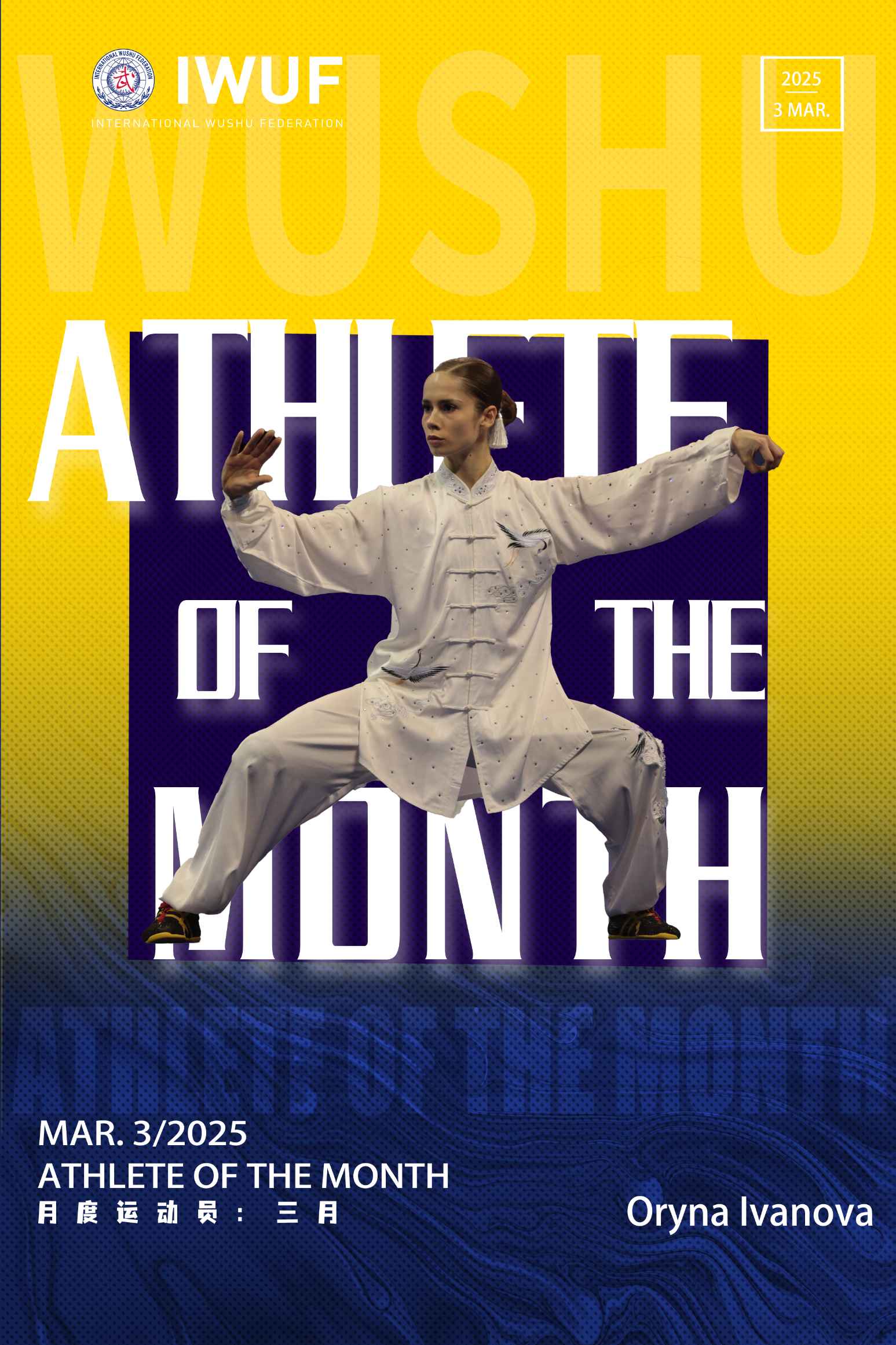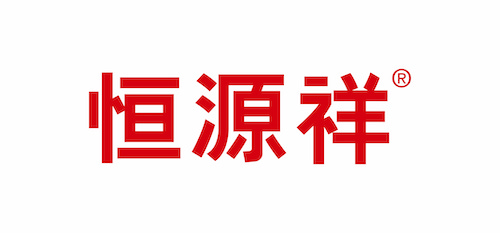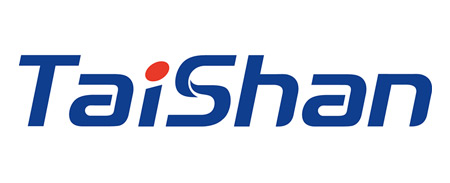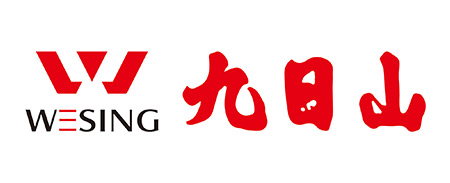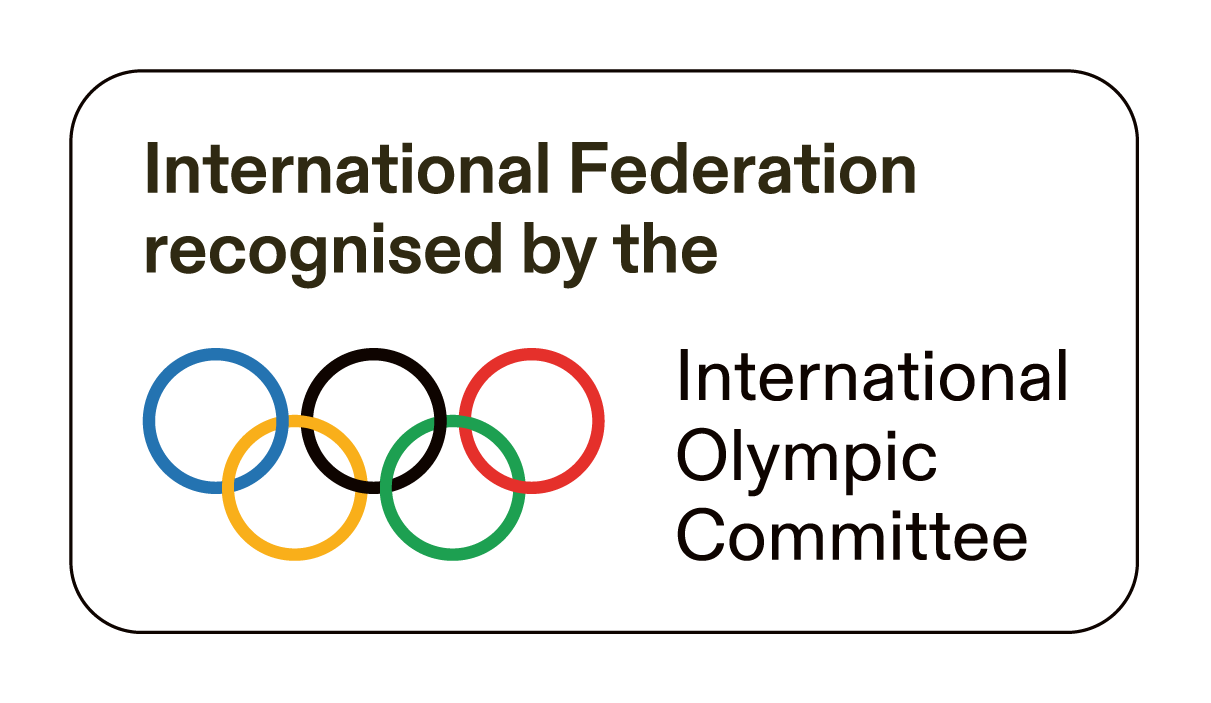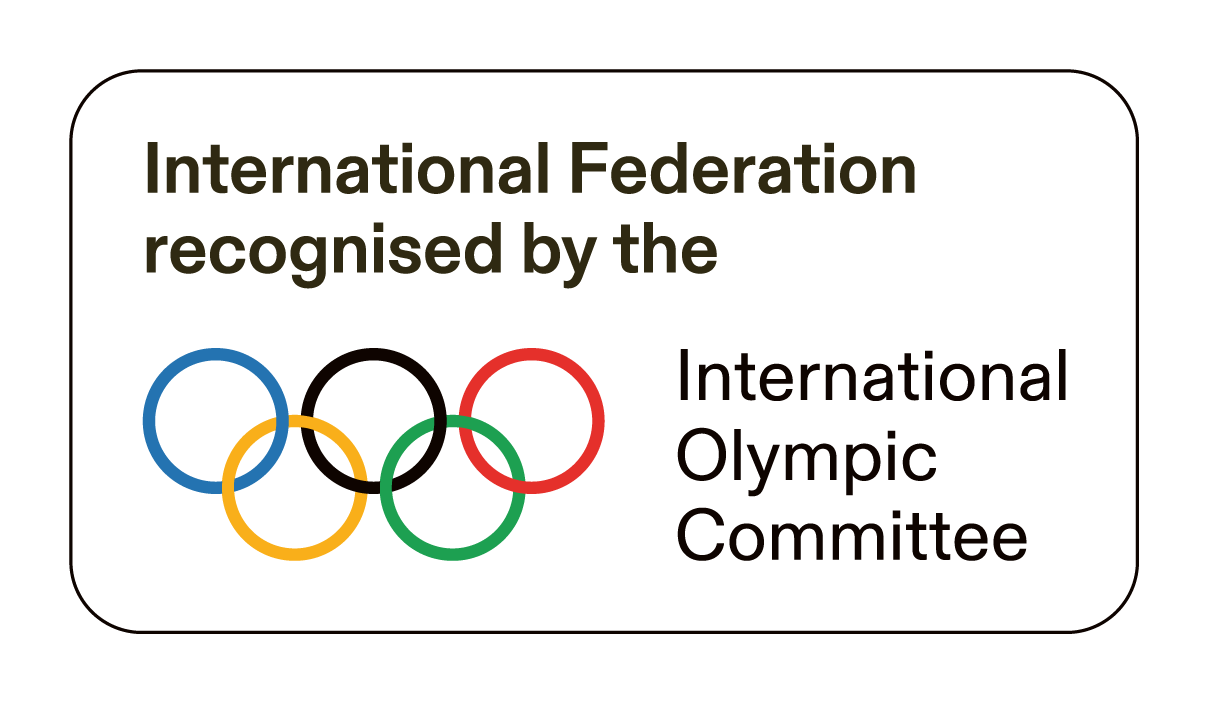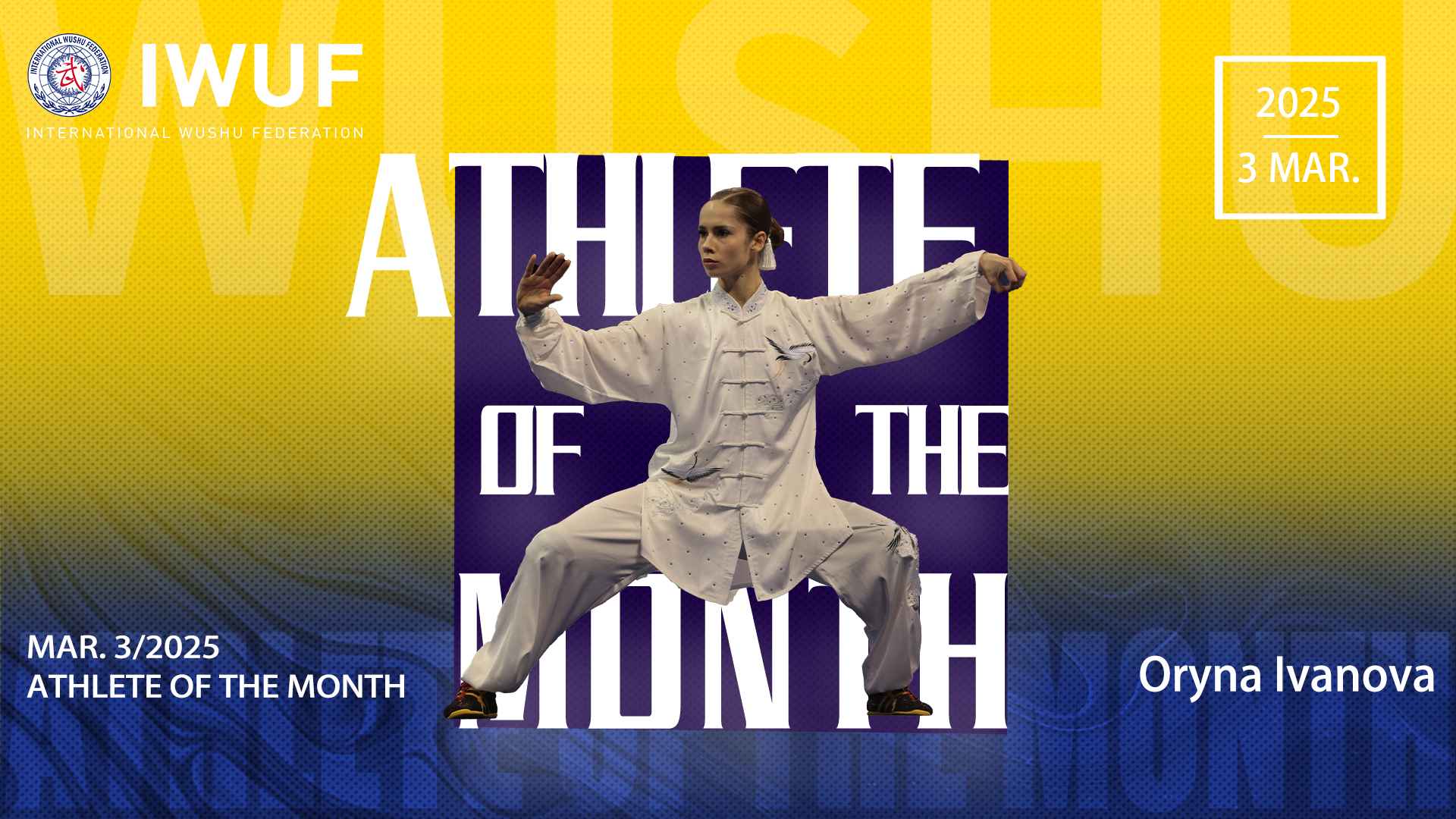
Ukraine’s bright and shining taiji star Oryna Ivanova has been practicing wushu since she was six years old. At the age of nine she entered a professional wushu school in her city of Brovary, and initially trained in changquan, jianshu, and qiangshu, and at the European Championships in 2016, she won gold in the changquan section. Then, at the age of 14, Oryna decided to transition to the taijiquan and taijijian program, which became the focus of her training. Her dedication led to significant achievements, including two bronze medals at the FISU University World Cup Combat Sports in 2022. In 2023, she secured 4th place in Taijiquan & Taijijian at the World Combat Games in Riyadh. In her debut at the World Championships, she placed 4th in taijijian and 5th in taijiquan at the 16th World Wushu Championships in Fort Worth. The following year, in 2024, she earned two gold medals at the 19th European Wushu Championships in Sweden, and a silver medal at the 4th World Taijiquan Championships in Singapore. Her achievements during the past three years are especially impressive and poignant as she has had to train under under difficult and challenging circumstances. “Each competition,” she says, “deepened my love for wushu and fueled my drive to push boundaries, honoring the art while inspiring others to embark on their own journeys.”
Wushu Beginnings
Oryna, now 22 years old, hails from the city of Brovary, in the Kyiv region of Ukraine. “I started practicing wushu at the age of six,” she recalls. “Coaches came to our classroom with an announcement that they were recruiting for a wushu group, told us what kind of sport it was, and handed out leaflets with a photo of Andrii Koval flying in a jump with a shuangdao. I noticed this jump and wanted to do it too. I asked my mom to enroll me in this class so that I could learn to jump like that.”

Oryna vividly remembers the excitement of the growing sport of wushu in Ukraine. “At that time,” she says, “the Ukrainian wushu scene was developing very fast because it was headed by Oleg Chukanov, the national team was powerful, and the Olympics in Beijing had just taken place, where Ukraine also participated in Beijing 2028 Wushu Tournament. At that time, all our coaches were active athletes. My coach suggested that I go through a selection process, which was done every Saturday at the Brovary Wushu School. They took kids for a trial training session, looking for physical qualities for wushu. I was selected and started training in a professional group in 2011.”
Oryna’s early training and competitions would usher her into Ukraine’s wushu community and lively sport scene. “My first training sessions were interesting,” she notes, “I was happy to go to training. At the first competition, I was very nervous, but I did everything the coach said, I have very funny photos of my eyes being very big. At the Ukrainian Wushu Championships, there were many children from different regions of Ukraine, the groups were very full. In the first years of training, I performed changquan, jianshu and qiangshu. The competition at the national level was high at that time, so it was not always possible to bring back results. But sometimes I brought back gold, silver, and bronze medals.”
Transitioning to Taiji – Magic Moment
At the age of 13, Oryna transitioned to taijiquan and taijijian at the recommendation of her coaches. “My transition to taijiquan and taijijian began when I was 13 years old at the Open Educational Training Wushu Seminar. My coaches set me the task of switching to these types and starting to learn the basic taijiquan and taijijian. My coaches advised me to switch to these sports because they saw that I could develop as an athlete there. To be honest, I was a little weak for changquan, jianshu and qiangshu. My coaches were right, because it was only when I switched to taijiquan and taijijian that I learned to jump nandu and gain some strength.”
The transition process was difficult, Oryna says, “Because taiji has completely different basics and is significantly different from what I had done before. I had a hard time enduring the workload, but I tried to be patient and try again, and again, trusting the coaches' vision. Also, the support of teammates helped a lot, we were going through the same thing, so it was easy for us to understand each other.”
She admits it was hard at first. “But when I started watching videos of other athletes performing,” she recalls, “I saw how beautiful and magnetic taiji can be, I saw what I could reach for. One day watching the performances lit a fire in me. I was fascinated by these movements, jumps, music, costumes, and I began to feel that I loved it with every cell in my body. From that day on, something changed in me, I began to dream a lot about performances, competitions, and that I would one day become a coach of taiji athletes. I really like the Chen style of taijiquan and taijijian. It is quite complex, rhythmic and unusual, which is why I like it. I also like that you can do a force release there.”
Maturing as a Taiji Athlete
Oryna’s recent achievements include winning two bronze medals at the FISU University World Cup Combat Sports in 2022, and 6th place in taijijian at the FISU World University Games Summer. Looking back on these FISU experiences, she says, “It was my first competition where I did optional taiji in the adult category. Of course, it was very scary, but also very interesting. With the support of the coaches and the team, it was easier to go perform. After these two competitions, I was incredibly motivated to keep working. These competitions helped me to become better.”
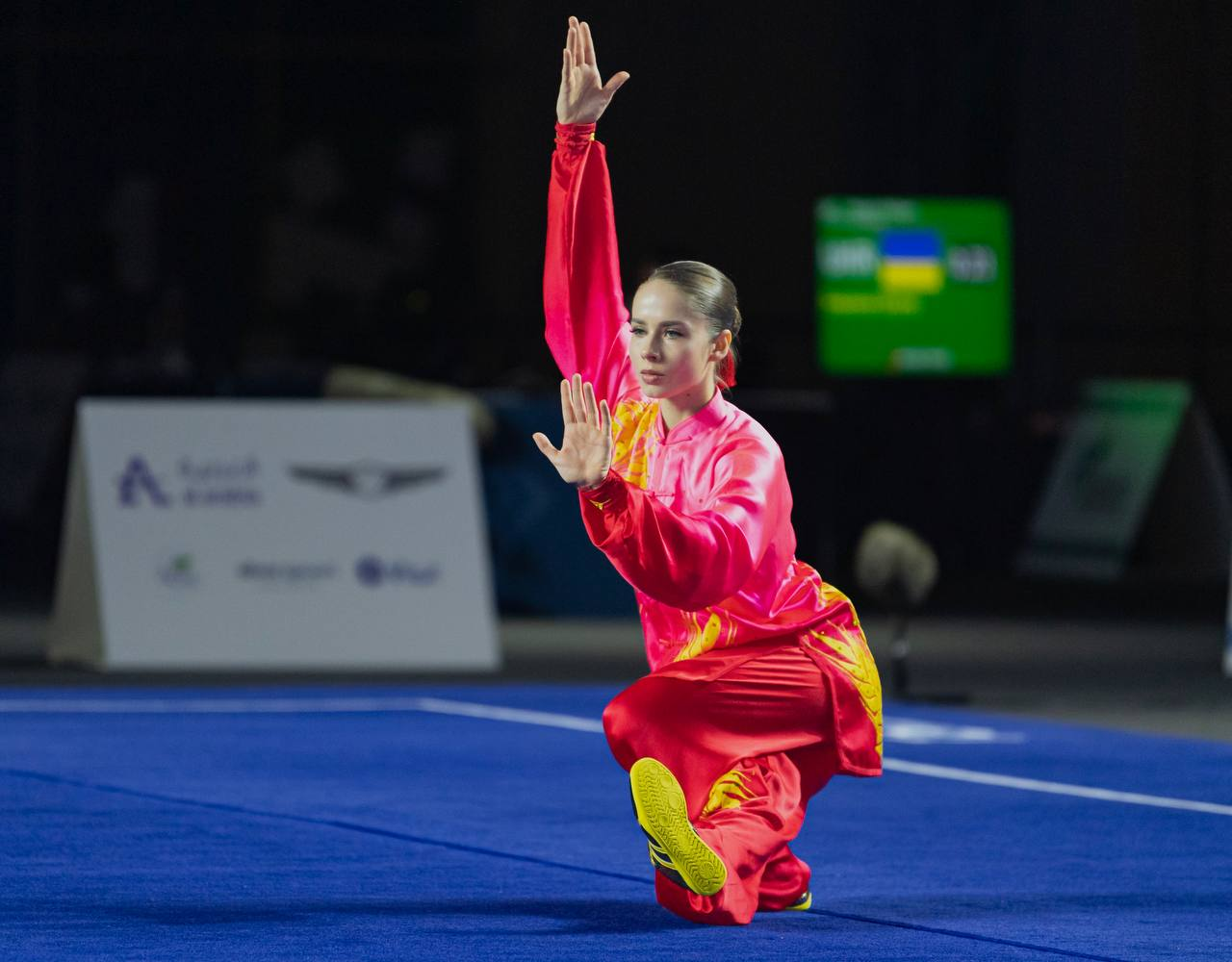
Next on the horizon would be the World Combat Games in Riyadh in 2023 where she secured 4th place in Taijiquan & Taijijian. “These competitions,” says Oryna, “were really a great preparation for the World Championships. I remember crying very loudly when I didn't get a medal (I laugh a little about it now). But it only made me stronger, and my coaches Oleg Chukanov and Andrii Koval and my teammates helped me cope with my emotions and focus on the World Championships ahead.”
Taiji at the World Championships
After an odyssey of long and challenging travel, Oryna and the Ukraine team arrived in America at Fort Worth for the 16th World Wushu Championships. Spectators would never guess she was suffering from nerves from watching her elegant and powerful performances up against the best taiji athletes in the world. She would end up placing 5th in taijiquan, and 4th in Taijijian, barely missing a medal by a fraction of a point.
Oryna recalls, “These were my first adult World Championships. I competed once at the World Junior Wushu Championships in Bulgaria, 2016, in the changquan, jianshu and qiangshu forms. At my first adult World Championships, I had better results than at the junior ones. The World Championships are very stressful competitions because they are qualifying for the Taolu World Cup and The World Games, which is very important for the development of sports in your country. I still remember those feelings during my performances, and that animal fear before going on the carpet.”
Oryna continues, “We had a very long journey to America. We traveled by bus from Ukraine to Budapest Then from Budapest we flew to Frankfurt, and from Frankfurt to Dallas. The trip took us two days. We had been preparing for about three months for this competition. I also remember that there was a crazy jet lag and everyone wanted to sleep. We celebrated our performances with a walk and went to eat tacos. The coaches were happy with the rating, and my teammates were very supportive and hugged me afterwards.”
Hitting a Golden Stride
Back on her own home continent of Europe, Oryna found her skills were sharpened and her confidence boosted by the World Championships experiences. The next challenge was the 19th European Wushu Championships in Sweden, which she met with cool aplomb -- and earning two gold medals. “The atmosphere at the European Championships is very friendly and supportive,” she says, “and we all communicate with each other, take a lot of photos, and give each other gifts. I was surprised when we received the results. I was very happy that everything turned out this way.”
Taiji Dream Realized
In 2024 Oryna would travel to Singapore for the 4th Wushu Taijiquan Championships, competing with the world’s elite top taiji athletes. There she won a silver medal, realizing a long-held dream. “This experience was different than at ordinary European and World Championships,” she says, ”because the best taiji athletes gathered and competed with each other, the competition was fierce. From the very beginning when I started practicing taiji, I dreamed of competing in this championship. I’m thankful to my coaches and my team for this experience. I did not expect to cross this stage and get a silver medal. It really inspired me to go further.”
Besides realizing her sport dreams in medals and technical skills, Oryna also appreciates the camaraderie of sport wushu. “Our entire team has a lot of friends,” she explains, “and we often communicate on Instagram and WeChat, and when we come to competitions, we give each other gifts, which is very nice. I feel that our community of athletes is very friendly, affectionate, supportive and pleasant.”
Wushu in Ukraine
We asked Oryna how she sees wushu developing in Ukraine and Europe in the next decade, and she answers, “I dream of strong progress, joint meetings, program improvements, and team projects. Only a team plan and hard work every day will help. We have to make wushu an accessible, understandable, safe sport. To stay alive, keep the athletes, the national team, and still have time to make everyone better, stronger.”
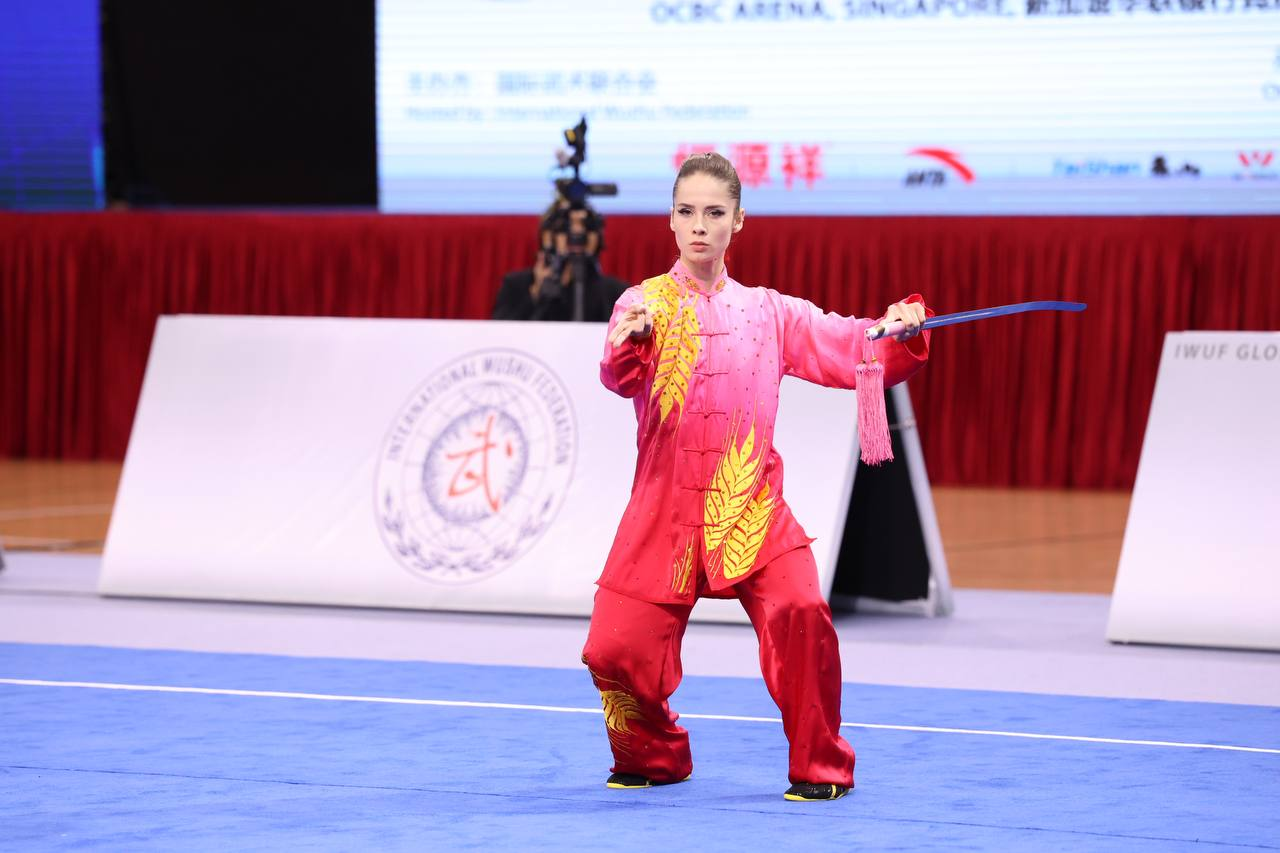
Oryna adds, “Our school was founded in 1993 in Brovary City, Kyiv region. Oleg Chukanov founded this school and the story began, thanks to him. Now we have a lot of young coaches of different levels and directions, the head coach is Andrii Koval, a student of Oleg Chukanov. As a child, I watched a lot of coaches perform, I was inspired by their performances, I never missed a single one. Our team hadn't been on a training camp abroad in 10 years, since 2014, But then we had the experience of training abroad. It was in China last year, and we are so grateful to the team that took us to the training because we gained a lot of new knowledge and gave us a huge charge for the coming years.”
Wushu Life
For Oryna personally, the biggest sport obstacle or challenge she has had to overcome in her wushu career is sports injury. “The biggest challenge for me is my knee injury,” she says. “I fully tore the ACL and both meniscus, had to undergo surgery and recover. Now I'm working very hard every day to recover well. It's good that taiji has a therapeutic effect, it helps me a lot to get used to the loads.”
She adds, “Also, I really want to help young athletes stay healthy; after the injury I started contacting surgeons, traumatologists and rehabilitators, collecting all important information on injury prevention and analyzing this issue constantly.”
“The best thing about sports,” Oryna continues, “is that you identify yourself in society. You've been involved in joint activities since childhood, you don't lose yourself, you have the support of coaches and friends all the time. You know that you really like it and that's enough to find yourself in this world. Also, the best thing about sports is the realization of dreams that are achieved together, with blood and sweat, but this moment of ‘we did it’ is the most valuable.”
Balancing Life and Wushu
With ongoing challenges, Oryna is happy to have the support of her family also, and her teachers, helping her balance her sport life, academic life and work. “My family is a little worried because this field is not stable in Ukraine,” she says, “but they fully support me and listen to the stories I bring back from the competition with delight.”
“Now I have a bachelor's degree in marketing,” she says, “which is how I got into marketing. But I don't want to work as a marketing specialist, unless I can help wushu grow and advance. It's very difficult to combine studies and sports. I remember taking exams between planes. Even on the bus and before competitions. It's so good that my teachers sometimes met with me and helped me to build a schedule to pass effectively. Now I want to get an education related to sports.”
“I have a lot of hobbies and it's hard for me to choose just one,” Oryna says. “I like to draw, crochet, write big notes, take online courses, play the kalimba, shoot and edit videos, take photos, and read books or manga. I really like to do all of these things, but I don't always have enough time for it.”
Wushu’s Path Ahead
Already training hard, Oryna plans to compete in the next World Wushu Championships in 2025 in Brazil. She comments, “Yes, my coaches and I are planning to compete there, and yes, I feel the pressure. Now our task is to get back everything I do before the injury, and to manage to improve my level during this time. But I know for sure that nothing is impossible.”
Regarding wushu being included in the 2026 Dakar Youth Olympic Games, she notes, “I am incredibly happy about this news and of course I hope to see young Ukrainian athletes there. The thought of it fills me with a sense of happiness and hope.”
And outside of winning competitions for her country, Oryna is also deeply committed to promoting the development of Ukraine wushu. She attended the International Wushu Judges Training & Certification Course in 2023 in Cairo, Egypt, and has more judging ambition in her future. “Of course,” she says, “the development of wushu in Ukraine is very important to me. I have already worked as a judge at the World Junior Wushu Championships in Brunei. In the future, I also want to be a judge for adult competition, but while I'm competing, I can only work at junior events.”
A Star Continues to Rise
Looking ahead, her star is only continuing to rise, and Oryna sees her goals clearly defined. “Wushu has had an incredible impact on my life,” she says. “Wushu helped me find myself, become stronger, both physically and mentally, discover my spirituality, it constantly teaches and allows me to develop. Wushu taught to respect mentors and work in a team. My goals for the future are to successfully undergo rehabilitation, to get results in the following competitions. Most of all, I want to achieve a medal at The World Games, because I know how important it is for the development of wushu in Ukraine. Ultimately, I wish, that watching my performances, people want to practice wushu. I want it to inspire someone to practice this sport and love it the way my coaches taught me.”
